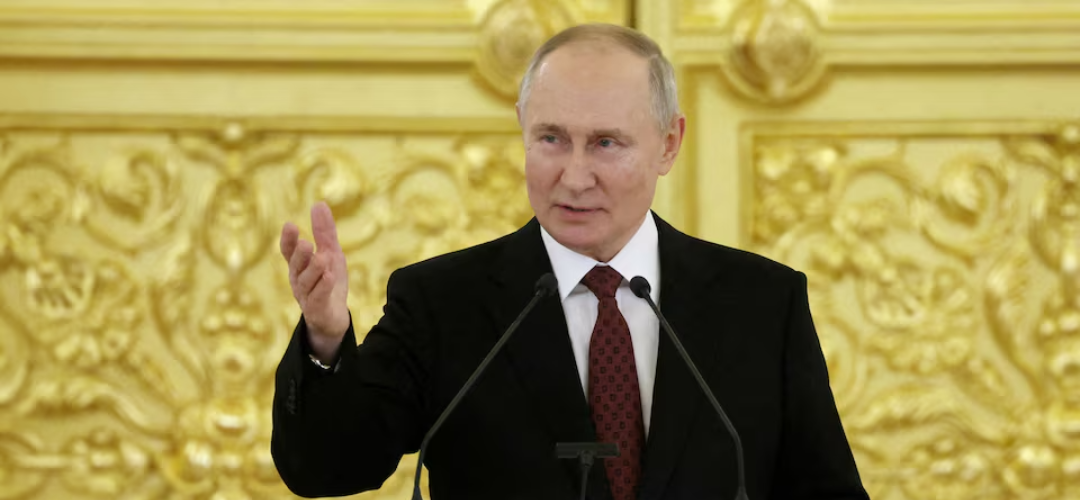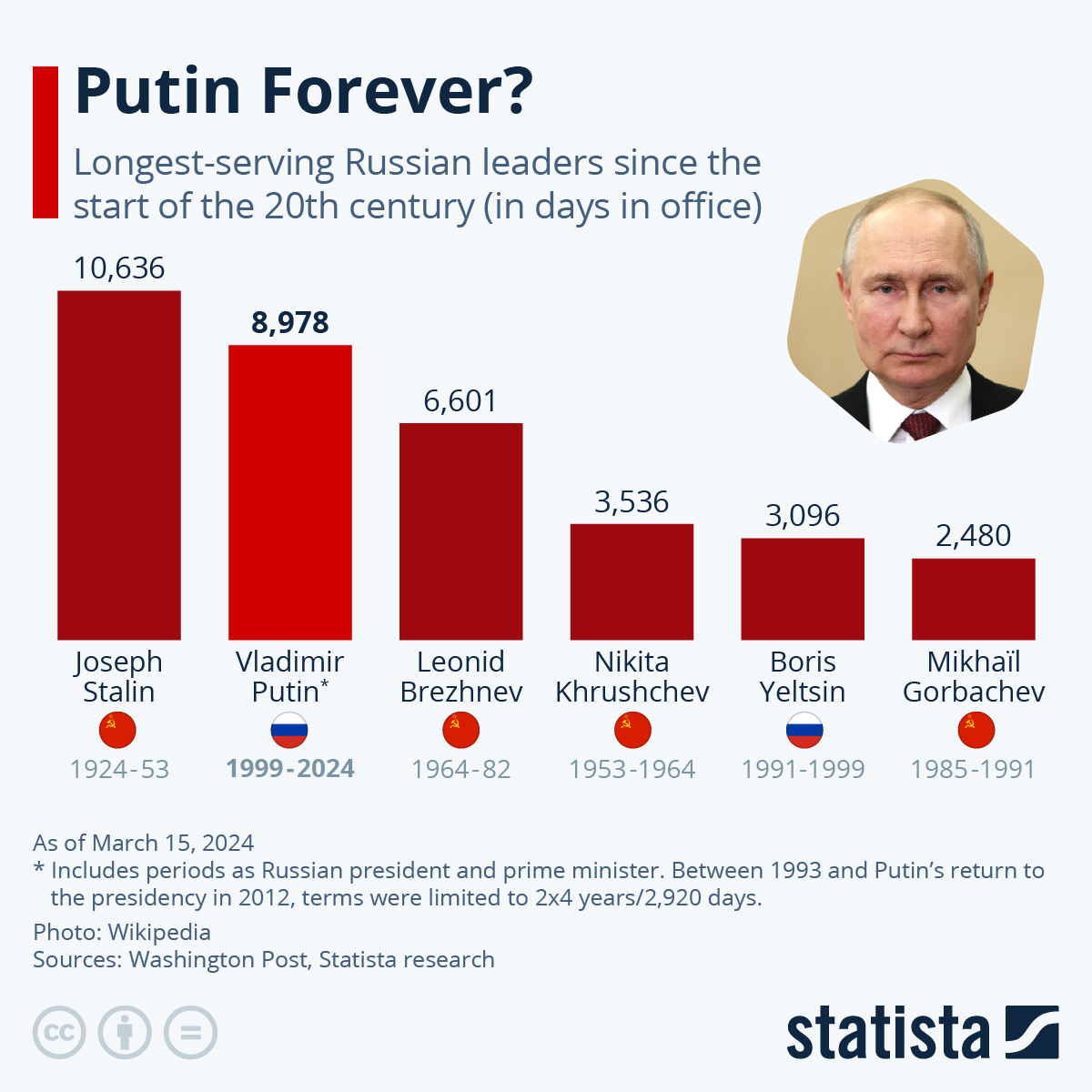Continuity in Kremlin
March 24, 2024 | Expert Insights

On March 18, in a simple yet markedly significant ceremony held in the historic Red Square, President Vladimir Putin was anointed into his fifth term as Russia’s President. Mr Putin won 87.3 per cent of the vote in a record turnout of 77.5 per cent. His nearest rival of the Communist Pary, Mr Nikolay Kharitonov, won a paltry 4.3 per cent.
Some interesting, albeit trivial, facts are connected to these elections. Since Mr Putin himself passed an amendment in the Duma in 2018 extending the Soviet-era tenure of the President from four to six years, he will continue in power at least till 2030. After that, he may seek yet another tenure as he will be only 77, an age at which Mr Trump is contesting for his second stint at the White House. Taking into account his tenures as the country's prime minister (1999-2000 and 2008-2012), Mr Putin has already overtaken Catherine the Great's record, who ruled for over 34 years! If he opts for another tenure post-2030, he will be the longest-ruling Russian since Peter the Great.
Background
The Russian elections were predicted well before the verdict, considering the fact that there was little real opposition. The reaction of the West was also along expected lines- calling the elections a “mockery of democratic values and principles.” Despite protests over the mysterious death of his principal political opponent, Alexi Navalny, in remote Siberia, Mr Putin was unflustered, calling his victory the will of the Russian people. Clearly emboldened, he has dismissed any criticism from the West and has vowed to continue his ‘Special Military Operations’ in Ukraine. This has multiple consequences for the region, locally and globally.
No one expected a grand surprise in the elections, so things settled down quickly after the formalities were done. While the West is not buying Putin's narratives, the Kremlin has successfully united the nation towards Putin and his 'Special Military Operation'. A possible extension of the conflict in Ukraine seems like the way forward with Putin's strong ideological companion successful on the domestic front. After successfully quashing skirmishes from the Wagner mercenary on Russian soil, Putin prepares to strengthen his political commitments to the Russian population in his fifth term.
Some independent vote monitoring groups in Russia have described the recent Russian election as the most fraudulent in the country’s history.

Analysis
Two years since the genesis of Russia’s Special Military Operations in Ukraine, the Kremlin has assured that their goals remain unchanged. Russia’s current military and strategic priority remains demilitarisation, denazification and ensuring the safety of citizens on captured lands. Putin has indicated intentions to broaden the security of the Russian Federation, responding to NATO expanding close to Russia. Putin has indicated his willingness to use deterrence weapons to counter NATO's expansion. Now, he has another six years to complete his grand design. We analyse what its shape could be.
Ukraine. With the elections successfully behind him, Putin might let the war continue, awaiting the U.S. election Results. Russia’s advance in February and Ukraine’s diminishing ammunition are signs of the West’s faltering resolve to support and secure the region. To enable the wheels of his tired military machine to continue to turn, the nation will have to muster greater strength into the Armed Forces and even attract foreign asylum seekers to fight under the Russian flag. However, discussions with Washington are an option for Russia only if it's on his terms. A primary condition for Russia is to control captured Ukrainian territory, which Kyiv declines to accept.
War Spill Out in the Region. With France preparing 2,00 troops to deploy in Ukraine, Russia does not view the French military’s actions as necessary and vows to have a stronger offensive. The U.S. had denied sending any soldiers to Ukrainian soil, however, the increase in NATO exercise operations in the region translated to NATO and its ally's commitment to security in case a war split out in the region.
Regaining the Energy Market. Losing most of its lucrative European energy market due to sanctions and the blowing up of the Nord Stream gas pipelines has left Russia vulnerable. Putin turns Eastward to green pastures to trade with the Dragon. Works to bring Russian gas to China via Mongolia have already begun through the Power of Siberia 2, providing China with 5 billion cubic metres of gas annually. Another new venture for Russia concerning energy is the Gas Hub in Turkey. It allows Russia to reroute its gas exports. The Northern Sea Route has been expanded by melting the Arctic Sea ice to link Murmansk near the border with Norway.
Raising Nuclear Stakes. The START (Strategic Arms Reduction Treaty) between Russia and the U.S. is on the verge of expiration. This results in limited power over strategic nuclear warhead deployment between the U.S. and Russia, presenting a challenge to the two nations. Russia has begun to maximise its defence spending, including alleged plans to deploy nuclear weapons in space, something that the Kremlin loudly denies.
Domestic Economics. Military production has contributed to the Russian economy’s growth by 4.6 per cent while shortage of labour and low productivity still plague the nation. Currently, defence and security consume 40 per cent of the budget. This has affected Healthcare and Education. With living standards decreasing in Russia, Putin's post-election priorities include cutting inflation and boosting life expectancy.
Assessment
- Russia, under Putin’s fifth term, will witness more continued intensive aggression towards Ukraine and possibly towards the NATO nations.
- Ties between non-West actors, such as China and Russia, are developing and will continue to grow despite the asymmetric nature, enhancing the multi-polar nature of the global order today.
- Countries like India will have to be more circumspect in balancing their ties with a strengthening Russia and an increasingly frustrated West.








Comments